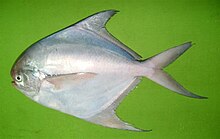Pampus argenteus, the silver pomfret or white pomfret (or pompano to avoid confusion with true pomfrets of the genus Bramidae), is a species of butterfish that lives in the Indo-West Pacific, spanning the coastal waters of the Middle East, Eastern Africa, South Asia, Southeast Asia, and East Asia.[2] The species has been reported only twice, one hundred years apart, from the central Mediterranean Sea.[3]
| Pampus argenteus | |
|---|---|

| |
| Scientific classification | |
| Domain: | Eukaryota |
| Kingdom: | Animalia |
| Phylum: | Chordata |
| Class: | Actinopterygii |
| Order: | Scombriformes |
| Family: | Stromateidae |
| Genus: | Pampus |
| Species: | P. argenteus
|
| Binomial name | |
| Pampus argenteus (Euphrasén, 1788)
| |
| Synonyms | |
| |
Silver pomfrets are usually silver/white in color, with few small scales. They can grow up to a range of 4–6 kg (8–13 lb). However, due to overfishing, specimens weighing less than 1 kg (2 lb) are more commonly seen.
The silver pomfret should not be mistaken for the Florida pompano (Trachinotus carolinus), which is a jackfish found off the coast of Florida in the Gulf of Mexico, and neither should be confused with true pomfrets, which are of the family Bramidae.
As food
editThis fish is prized in the Indo-Asia-Pacific region for its taste. Its flesh is soft and buttery when cooked. It is called "Rupchanda" in Bengali, pamplet in Marathi[4] or Maanji in Mumbai, paaplet (Konkani: पापलेट) in Goa, avoli (Malayalam: ആവോലി) in Kerala and vawall (Tamil: வௌவால்) in parts of South India. It is called zubaidi in Arabic, which is derived from the word zubdah, meaning 'butter', due to its tender flesh. In Malaysia it is known as bawal putih.
In Korea, the fish is known as byeongeo (병어) and is often grilled into gui and eaten as a banchan (side dish). It is also a popular dish in Chinese cuisine, where it is called yínchāng (銀鯧) and is often served steamed or braised.
Pomfret is especially popular in Kuwait, and it is one of the most expensive types of fish in the market,[5][6] with the Kuwaiti Pomfret (Gulf Arabic: زبيدي كويتي, romanized: zbēdi kwēti), caught in the waters of Kuwait, being the most sought-after followed by the Iranian Pomfret (Gulf Arabic: زبيدي ايراني, romanized: zbēdi īrāni). The Kuwaiti government regularly bans the fishing of the Kuwaiti type to allow the fish to reproduce.[5] Mtabbag Zbedi (Gulf Arabic: مطبق زبيدي, romanized: mṭabbag zbēdi) is a popular Kuwaiti dish made with fried Pomfret, spices, and rice, with daqqūs, Kuwaiti home-made hot sauce, usually added.
References
edit- ^ Kent Carpenter (IUCN SSC Global Marine Species Assessment, Old Dominion University; Agency), Stanley Hartmann (Abu Dhabi Environment; Research), Ebrahim Abdulqader (Bahrain Center for Studies and; Research), James Bishop (Kuwait Institute of Scientific; Institution), Farhad Kaymaram (Iranian Fisheries Research; Research), Mohsen Al-Husaini (Kuwait Institute for Scientific; Almukhtar, Mustafa (February 23, 2014). "IUCN Red List of Threatened Species: Pampus argenteus". IUCN Red List of Threatened Species – via www.iucnredlist.org.
- ^ "Pampus argenteus, Silver pomfret : fisheries". www.fishbase.se. Retrieved 2022-07-12.
- ^ Atlas of Exotic Fishes in the Mediterranean Sea (Pampus argenteus). 2nd Edition. 2021. 366p. CIESM Publishers, Paris, Monaco.https://ciesm.org/atlas/fishes_2nd_edition/Pampus_argenteus.pdf
- ^ Nadkarni, Pooja. "Paplet Hooman Recipe - Goan Pomfret Curry".
- ^ a b "ارتفاع أسعار سمك "الزبيدي" في الكويت لمستويات عالية (شاهد)". عربي21. February 2, 2021.
- ^ "كود سمك زبيدي كويتي بـ 130 دينارا !".
